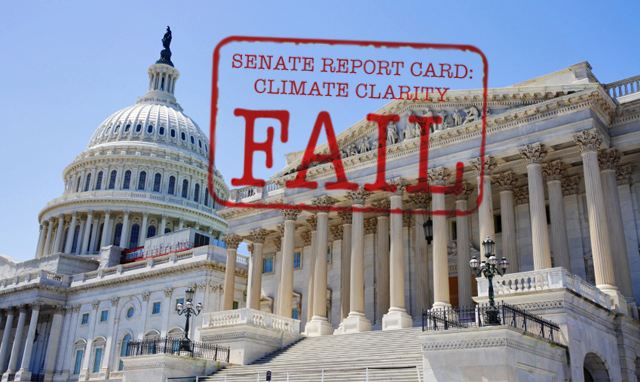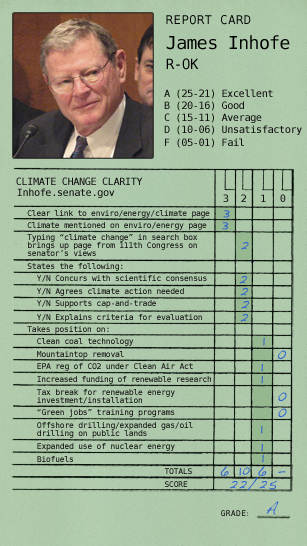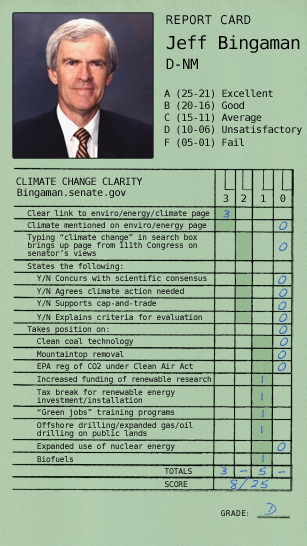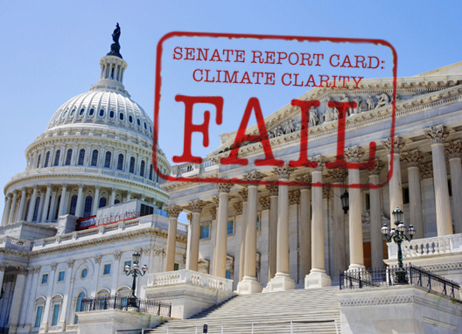 Grist got to wondering, “Can voters in all 50 states go online and easily find out what a senator thinks about climate change and energy policy?”Photo illustration by Tom Twigg / Grist
Grist got to wondering, “Can voters in all 50 states go online and easily find out what a senator thinks about climate change and energy policy?”Photo illustration by Tom Twigg / Grist
Listen up, James Inhofe, because this might be the only compliment Grist ever pays you: You’ve got a decent website. Despite your wacked-out view that climate change is a “hoax” and your opposition to a climate bill, inhofe.senate.gov does a fair job of making your climate and energy positions clear and accessible to the Oklahomans who voted to send you to Washington.
In fact, your website is more transparent than the sites of many senators who completely disagree with your views on global warming, including Democratic leaders Harry Reid (Nev.) and Richard Durbin (Ill.), along with two of the most influential senators when it comes to environmental policymaking — Barbara Boxer (Calif.) and Jeff Bingaman (N.M.).
 Illustration by Tom Twigg / GristFor citizens looking for information on their senators’ positions on energy and climate change policy, official Senate websites are a logical place to start. After all, senators get taxpayer money to produce the sites. And at the other end of Pennsylvania Ave., President Obama has pledged to boost government transparency online through the new data.gov, usaspending.gov, and the revamped whitehouse.gov.
Illustration by Tom Twigg / GristFor citizens looking for information on their senators’ positions on energy and climate change policy, official Senate websites are a logical place to start. After all, senators get taxpayer money to produce the sites. And at the other end of Pennsylvania Ave., President Obama has pledged to boost government transparency online through the new data.gov, usaspending.gov, and the revamped whitehouse.gov.
And, well, it’s the 21st century. You would think a U.S. senator would put up a useful site as a basic way of communicating with constituents. You would think.
In the interest of transparency, Grist combed the official websites of 99 senators (Al Franken didn’t have one at the time of our review) and rated them on how well each explained a senator’s positions on climate change and energy policies. Our grading system gave senators points for stating whether or not he or she agrees with the scientific consensus on climate change, whether a site lists the criteria for how the lawmaker will evaluate a climate bill, and whether it describes a senator’s positions on a variety of energy policies — including renewable research incentives, “clean coal” research, expanded use of nuclear energy, increased offshore and domestic oil and gas drilling, and incentives for biofuel production. Again, the focus was on transparency; senators who oppose climate legislation or doubt the science of global warming were not penalized for their views, only if they failed to make those views clear and accessible on their sites.
The results aren’t pretty. We found a distinct lack of information among Democrats and Republicans alike, senators with and without strong environmental voting records, and from all regions of the country. See our full methodology and results for each senator on the next page.
Under our grading scale, 53 senators scored a C or worse. Twenty-five sites had no mention of climate change or global warming. Only 60 offered an opinion of cap-and-trade — the leading approach in Congress for reducing carbon emissions — on their energy or environment pages.
Sheldon Whitehouse‘s (D-R.I.) environment page still refers to “President Bush.” Lamar Alexander‘s (R-Tenn.) “Energy and Environment” page brought up an error message. Robert Byrd‘s (D-W.V.) climate page does not appear to be linked to the rest of his site. Three senators posted no information at all on climate or energy issues: Minority Leader Mitch McConnell (R-Ky.), Thad Cochran (R-Miss.), and Roland Burris (D-Ill.)
Two sponsors of past climate legislation, John McCain and Joe Lieberman, had sharply diverging scores. Lieberman (I-Conn.) scored 20 on the 25-point scale—a relatively high score. McCain (R-Ariz.) scored a 7.
The examination also revealed sharp regional differences. Senators from Pacific states (California, Oregon, Washington, Alaska, and Hawaii) had the highest-scoring sites, averaging 17.3 points out of 25. Next were Northeastern senators, with an average score of 17.1.
Southern senators scored the lowest (9.2), with the Southwest (11.4), Midwest (11.9), Plains (13.8), and Mountain West (13.8) falling in the middle.
More highlights:
- Democrats generally scored higher than Republicans, but not by much. They averaged 14.5 out of 25 to the GOP members’ 11.9.
- There was a small correlation between a pro-environment voting record and a useful website. Out of returning senators who were rated by the League of Conservation Voters’ 2008 National Environmental Scorecard, the 26 senators with a perfect LCV score (100) averaged 16.8 on our transparency scale. Those receiving the lowest LCV scores (0, 9, or 18 points) averaged 11.7 in transparency.
- Looking at specific energy sources, senators were most willing to comment on increased funding for renewable sources (wind, solar, etc.), with 88 including some mention on their sites. Eighty-six mentioned biofuels. Forty addressed expanded use of nuclear energy and 55 “clean coal” technologies. Only nine mentioned mountaintop removal (MTR) coal-mining, and only of two of them are from states where the practice is common — Alexander of Tennessee and Jay Rockefeller of West Virginia.
Prefer letter grades? By assigning each grade a 5-point range, we would have handed out 14 A’s, 32 B’s, 22 C’s, 19 D’s, and 12 F’s. Many students would find this grading to be very generous. If we used a more common academic scale in which less than 60 percent is a failing grade, 50 senators would have flunked. So as to not reward mediocrity, Grist did not grade on a curve.
 Bingman chairs the Senate Energy and Natural Resources Committee, but his official website doesn’t reveal his views on topics he has great influence over.Illustration by Tom Twigg / GristThe range of information on climate and energy, from useful to useless, is par for the course for congressional sites, according to John Wonderlich, policy director of the Sunlight Foundation, a Washington group that works to promote transparency in government.
Bingman chairs the Senate Energy and Natural Resources Committee, but his official website doesn’t reveal his views on topics he has great influence over.Illustration by Tom Twigg / GristThe range of information on climate and energy, from useful to useless, is par for the course for congressional sites, according to John Wonderlich, policy director of the Sunlight Foundation, a Washington group that works to promote transparency in government.
“This is something we should expect senators to do on their websites,” he said. “But there’s no requirement that they do so. That actually makes it more interesting because it reflects their priorities — what they choose to put on their sites, what they choose to talk about.”
In the House of Representatives, many lawmakers considered to be key swing votes on the landmark Waxman-Markey bill last month withheld their opinion up until the last minute. Wonderlich said there is motivation for senators to do the same.
“There’s an incentive to not have a clear position,” he said. “For a senator whose vote is going to be courted, it’s in their interest to be a little bit coy, because their vote becomes a bargaining chip … It’s all about jockeying for clout within your caucus, or trying to get a committee seat, or trying to secure support for some other measure.”
Of course, that comes at the expense of citizens trying to find a senator’s views, he said.
Here’s our full grading criteria, followed by a list of how senators scored.
Our Criteria
How easy it is to find information about a senator’s views on climate change and energy was judged by the following measures:
- Is there a clear, permanent link to an energy, environment, or climate page from the homepage or “issues” page? (3 points)
- Is climate change mentioned on the energy/environment/climate page? (3 points)
- Does typing “global warming” or “climate change” in the search box bring up a link (on the first page of results) to a page or document with the senator’s views? (2 points)
On the energy/environment/climate page, is the following information available:
- Whether the senator concurs with scientific consensus on climate change? (2 points)
- Whether the senator agrees climate change action is needed? (2 points)
- Whether the senator supports or opposes cap-and-trade regulation? (2 points)
- Does the senator explain his or her principles or criteria for evaluating energy legislation? (2 points)
Does a senator’s site contain specific information on how he or she feels about any of the following:
- Clean coal technology? (1 point)
- Mountaintop removal mining? (1 point)
- EPA regulation of carbon dioxide under the Clean Air Act? (1 point)
- Increased funding for renewable energy research? (1 point)
- Permanent or extended tax break for renewable energy investment or installation? (1 point)
- Government programs to train workers for “green jobs”? (1 point)
- Offshore drilling or expanded gas and oil drilling on public lands? (1 point)
- Expanded use of nuclear energy? (1 point)
- Biofuels? (1 point)
Total: 25 points
The results
See also the full set of results for each senator (as a spreadsheet). Notice patterns or suprises that we didn’t note? Email us or comment below.
Vanessa Kerr and Claire Thompson contributed reporting to this story.


